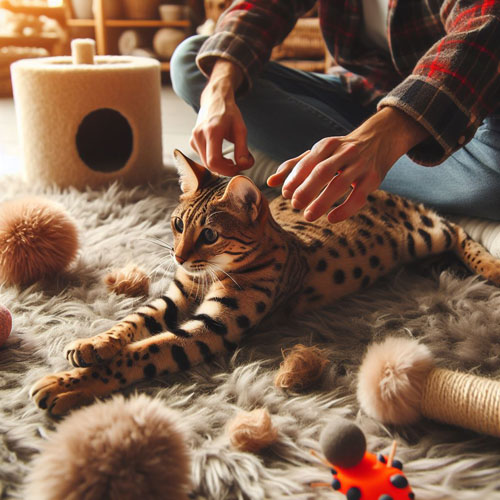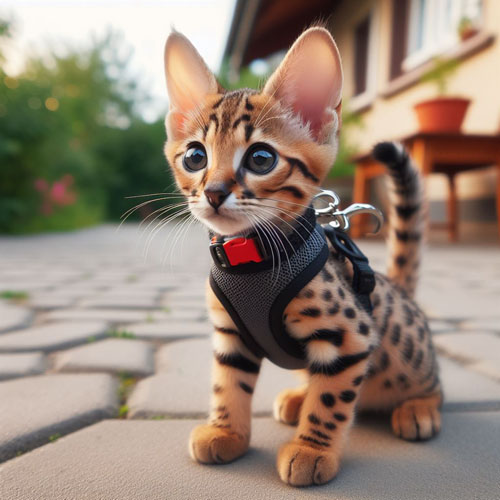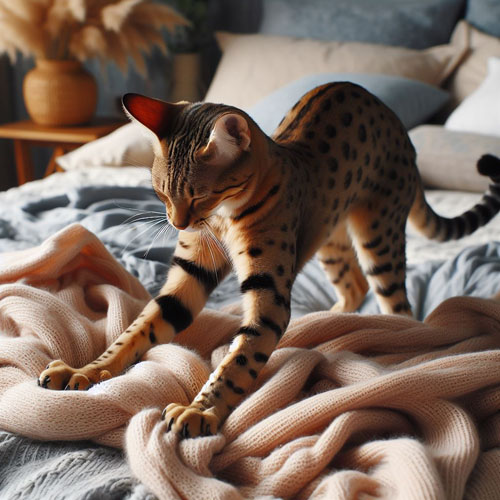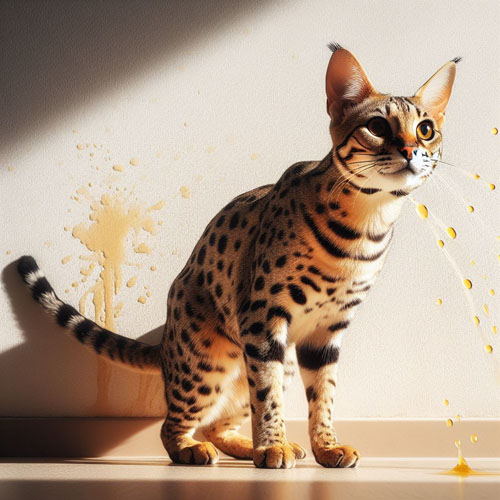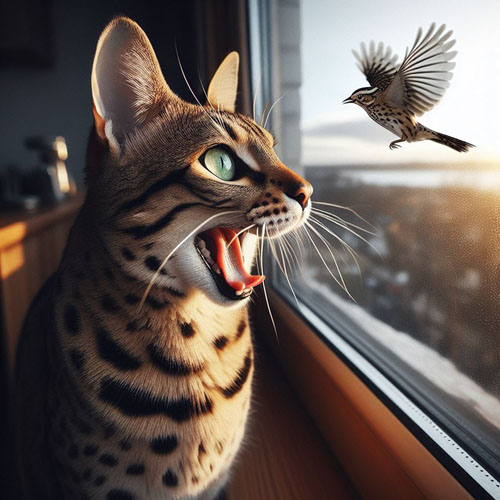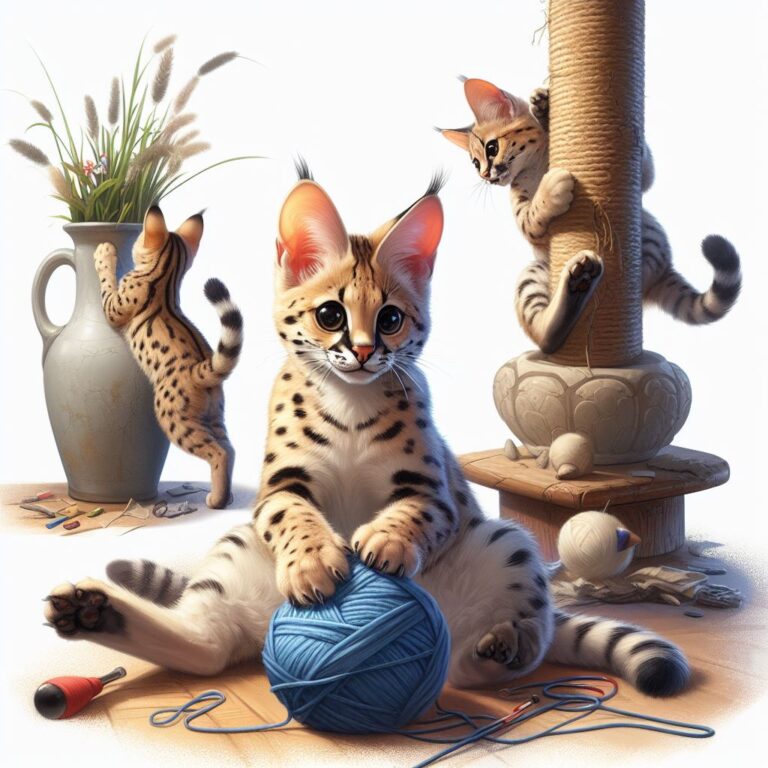Addressing Playful Biting in Savannah Cats
Understanding and Addressing Playful Biting in Savannah Cats: A Guide to Feline Behavior
Savannah cats, with their distinctive appearance and playful nature, are known for their engaging interactions with their owners. However, some owners may find themselves wondering why their Savannah cat bites so hard during play. This behavior, while common in many cats, can be more pronounced in Savannahs due to their unique characteristics. In this article, we’ll explore the reasons behind this behavior, the importance of understanding feline instincts, and practical tips for managing and redirecting playful biting in Savannah cats.
Instinctual Hunting Behavior: The first key to understanding why a Savannah cat may bite with intensity during play lies in their instinctual hunting behavior. Savannahs, being a hybrid of domestic cats and the wild serval species, retain strong predatory instincts. Play, for a cat, mimics the hunting experience, and biting is a natural part of this behavior. When a Savannah bites during play, it’s often an expression of their natural hunting instincts, and the intensity of the bite can vary based on the individual cat’s personality and energy levels.
Communication and Socialization: Biting is also a form of communication and socialization for cats. In the wild, felines use biting to establish dominance, communicate boundaries, or signal their readiness to play. Savannah cats, being highly social and intelligent, may use biting as a means of expressing their feelings, whether it’s excitement, affection, or a desire to engage in play. It’s crucial for owners to observe their cat’s body language and understand the context in which the biting occurs to interpret these signals accurately.
Teething and Exploration: Like all kittens, Savannah cats go through teething stages during their early months. Biting and chewing help alleviate the discomfort associated with teething and contribute to the exploration of their environment. Owners may notice an increase in biting behavior during these stages, and providing appropriate chew toys can help redirect their biting tendencies onto more suitable items.
Energy Release and Exercise: Savannah cats are known for their high energy levels and need for regular exercise. Play, including biting, is a way for them to release pent-up energy and stay physically active. If a Savannah cat doesn’t receive sufficient playtime and mental stimulation, they may resort to more intense biting as a means of expending excess energy. Regular interactive play sessions, involving toys that allow them to engage their hunting instincts, can help address this need.
Establishing Boundaries: In some instances, a Savannah cat may bite more forcefully to establish boundaries or communicate discomfort. Understanding the cat’s body language and respecting their signals is crucial in fostering a positive and trusting relationship. Owners should pay attention to cues such as flattened ears, twitching tails, or dilated pupils, which may indicate that the cat is feeling stressed or overstimulated. Creating a safe and calm environment and allowing the cat to initiate and control play can help mitigate aggressive biting tendencies.
Managing Playful Biting: While understanding the reasons behind playful biting in Savannah cats is essential, it’s equally important to manage and redirect this behavior to ensure a harmonious relationship between the cat and its owner.
- Interactive Play Sessions: Engaging in regular, structured play sessions with your Savannah cat using interactive toys can help channel their energy in a positive way. Wand toys, laser pointers, and feather wands are excellent choices to mimic hunting activities and provide an outlet for their natural instincts.
- Use of Appropriate Toys: Providing a variety of appropriate toys for your Savannah cat to bite and chew is essential. Plush toys, puzzle feeders, and chew toys can divert their attention from biting your hands or clothing. Rotate the toys regularly to keep them interesting and stimulating for your feline companion.
- Positive Reinforcement: Reinforce positive behavior with praise and rewards when your Savannah cat exhibits gentle play. Positive reinforcement helps them understand the boundaries of acceptable play behavior and encourages them to engage in more controlled and less aggressive interactions.
- Training and Obedience Commands: Implement basic training commands such as “no” or “gentle” consistently during play. Associating these commands with a pause in playtime when biting becomes too intense can help the cat understand that excessive force is not acceptable. Consistency is key in reinforcing these boundaries.
- Consultation with a Veterinarian: If your Savannah cat’s biting behavior seems excessive or is accompanied by signs of distress, it’s advisable to consult with a veterinarian. Health issues, discomfort, or underlying behavioral problems could contribute to heightened biting tendencies, and a professional evaluation can provide valuable insights into addressing these issues.
Conclusion: Understanding why a Savannah cat may bite with intensity during play involves recognizing their instinctual behaviors, communication methods, and individual personality traits. By providing appropriate outlets for their natural instincts, engaging in structured play sessions, and reinforcing positive behavior, owners can foster a healthy and enjoyable relationship with their playful Savannah companion. Additionally, being attuned to the cat’s cues and respecting their boundaries ensures a safe and mutually satisfying interaction between the cat and its human family.
Keywords: Savannah cat biting behavior, Feline instincts and play, Managing cat aggression, Playful biting redirection, Understanding cat communication
